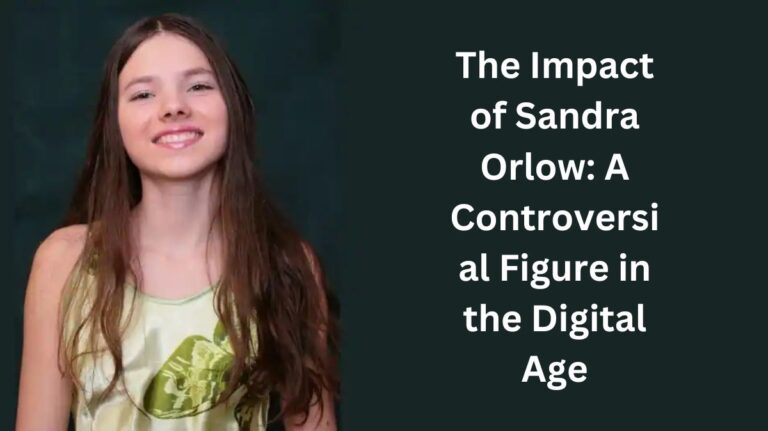Introduction to Sandra Orlow
Sandra Orlow is a name that evokes a mix of fascination and controversy. In the digital landscape, few figures have stirred the pot quite like her. With a career that began in adult entertainment and quickly transitioned into social media fame, she became an emblem of both empowerment and debate. Her online presence has sparked discussions about sexuality, self-expression, and the responsibilities that come with influence.
But who is Sandra Orlow beyond the headlines? What makes her so compelling—and polarizing—in today’s society? As we dive into her story, we’ll explore not just her journey but also how she’s shaped internet culture. From legal battles to societal impacts on young audiences, let’s unpack the complexities surrounding this controversial figure in our digital age.
Controversies Surrounding Orlow and Her Website
Sandra Orlow has been at the center of numerous controversies since she launched her website. Critics argue that her content blurs the lines between creative expression and exploitation.
Many are concerned about the provocative nature of her work, claiming it promotes unrealistic beauty standards among young audiences. This debate often sparks heated discussions on social media platforms.
Orlow’s followers appreciate her boldness, viewing her as a trailblazer in self-expression. However, detractors worry about the potential influence she wields over impressionable teens navigating their identities online.
The stark divide in public opinion showcases how digital personalities can embody both empowerment and concern in today’s society. As more people engage with digital content creators, questions about ethical responsibility become increasingly crucial.
Legal Battles and Censorship Attempts
Sandra Orlow’s presence on the internet has not been without its challenges. From the outset, her website faced scrutiny and legal battles that highlighted the tension between digital expression and societal norms.
Various organizations have attempted to censor her content, citing concerns over age-appropriateness and potential exploitation of young audiences. These attempts sparked debates about freedom of speech versus responsible online behavior.
Orlow fought back against these censorship efforts, leading to high-profile court cases that attracted media attention. Her resilience in defending her platform raised questions about the boundaries of creative expression in an increasingly regulated digital landscape.
The controversies surrounding these legal battles often overshadowed Orlow’s original intentions. They forced both supporters and critics to reckon with what it means to navigate a world where personal branding can collide violently with public perception.
The Influence of Orlow on Internet Culture and Teenage Girls
Sandra Orlow has carved out a notable niche in internet culture, particularly among teenage girls. Her online presence has sparked both admiration and criticism, establishing her as a polarizing figure.
With an aesthetic that blends glamour and rebellion, she appeals to young audiences seeking identity and expression. Many are drawn to her unapologetic authenticity, resonating with the desire for individuality in a world of conformity.
Orlow’s influence extends beyond mere entertainment; it shapes aspirations. Young girls often look up to figures like her as role models, imitating styles and behaviors showcased across platforms.
However, this impact is complex. While she promotes self-expression, it also raises questions about societal standards of beauty and success. As young fans navigate their formative years influenced by such personalities, they grapple with the dichotomy between reality and curated online personas.
Criticisms against Orlow’s Actions and Effects on Young Audiences
Sandra Orlow’s actions have not gone unnoticed, especially by critics who are concerned about the impact on young audiences. Many argue that her content promotes unrealistic body standards and a hyper-sexualized image of women. This portrayal can lead to harmful self-image issues among impressionable teenagers.
The accessibility of her website poses another challenge. Young girls may stumble upon explicit material before they are ready to process it. Critics fear this exposure can warp their understanding of relationships and intimacy at a formative age.
Furthermore, some believe that Orlow glamorizes a lifestyle rooted in superficiality and objectification. This has sparked debates about the responsibilities public figures hold in shaping cultural narratives for youth. As conversations grow louder, many advocate for greater awareness regarding such influences online.
The Legacy of Sandra Orlow in the Digital Age
Sandra Orlow’s presence in the digital landscape is undeniable. She stands as a symbol of both empowerment and controversy. Her bold choices have sparked conversations about personal agency and online identity.
Her impact reaches beyond just her website; she has influenced countless young individuals navigating their own paths in the digital realm. Many look up to her, seeing a reflection of their aspirations and struggles.
As social media continues to evolve, so does Sandra’s role within it. She showcases the complexities of fame in an age where attention can be fleeting yet powerful.
The discussions surrounding her legacy reveal deeper societal issues too—particularly concerning self-image, consent, and the blurred lines between public personas and private lives. In many ways, she has become a touchstone for debates on these critical topics today.
Conclusion
The story of Sandra Orlow is a complex tapestry woven with threads of controversy, influence, and cultural significance. As a figure in the digital age, she has provoked discussions that extend far beyond her online presence. From legal battles to censorship attempts, her journey has highlighted the difficulties many face in navigating freedom of speech versus societal expectations.
Orlow’s impact on internet culture cannot be understated. She resonates particularly with young audiences who find themselves caught between admiration and criticism. Her actions have sparked debates about authenticity and responsibility in an increasingly connected world.
Critics raise valid concerns regarding the effects of her choices on teenage girls and impressionable youth. The conversation surrounding these issues continues to evolve as society grapples with how we define role models today.
As we reflect on Sandra Orlow’s legacy, it becomes evident that she is more than just a controversial figure; she embodies the complexities of modern digital life itself. Whether one views her positively or negatively, there’s no denying that her presence challenges us to think critically about our values in this new era.
